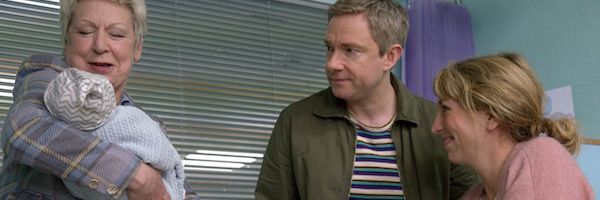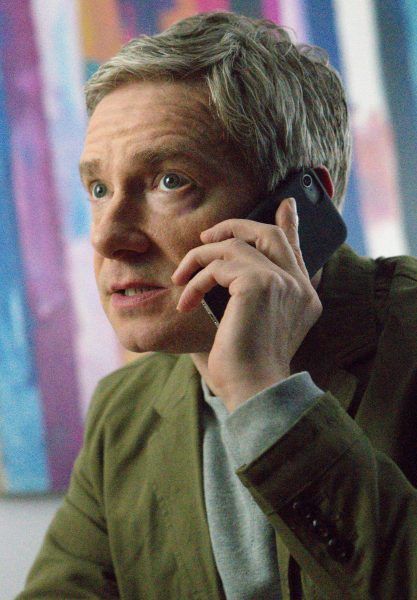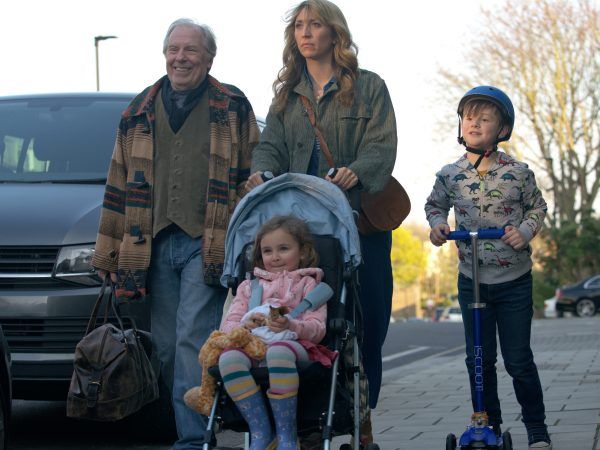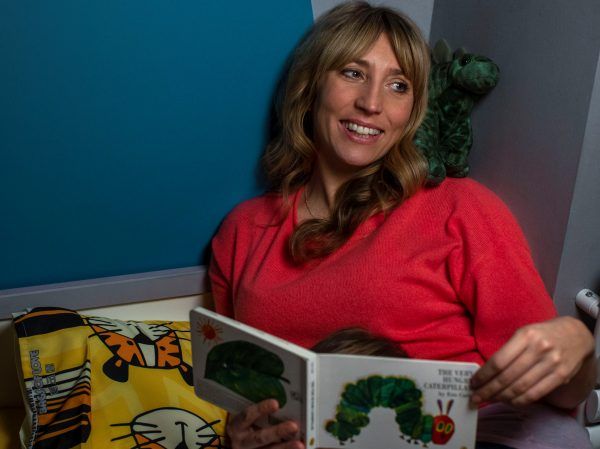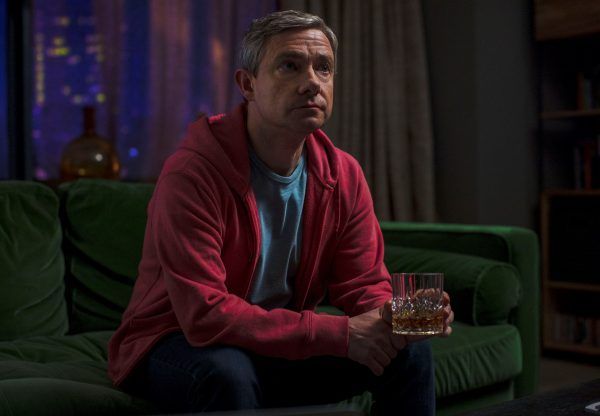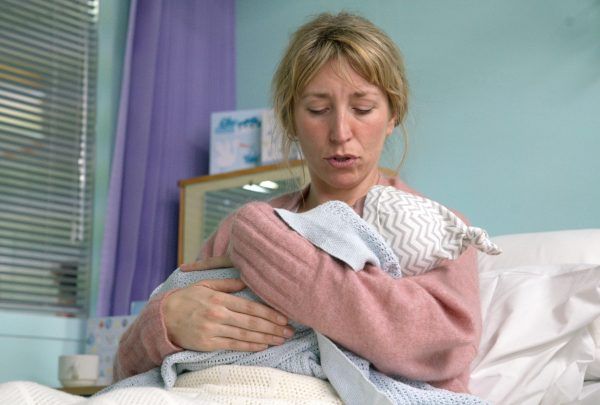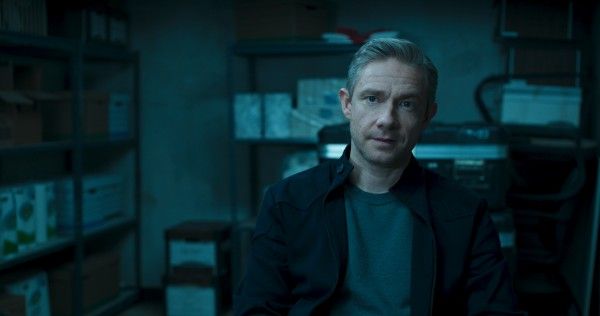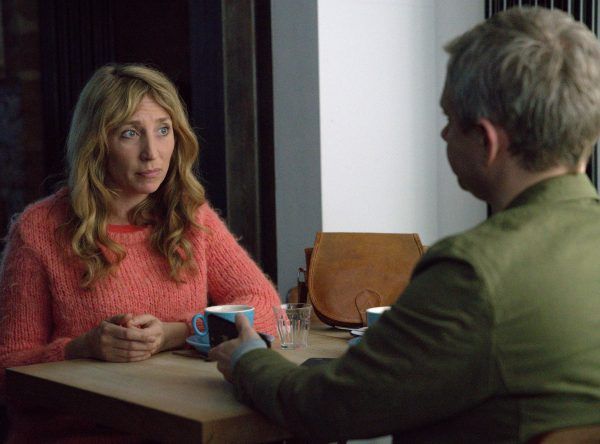From co-creators Martin Freeman, Simon Blackwell and Chris Addison, the 10-episode FX series Breeders follows Paul (Freeman), a caring father who’s learning that it’s all just a lot harder than he ever could have imagined. His partner in life and parenthood is Ally (Daisy Haggard) who, along with Paul, is juggling a full-time career, a mortgage, and young children that try their patience in a way that often pushes them to the edge until they’re reminded of just how much they actually love them.
During this interview with Collider, co-stars Martin Freeman (who’s also an executive producer on the series) and Daisy Haggard talked about how this series evolved, taking an idea from a dream and turning it into an actual show, learning from this experience, making sure that this is a believable couple, how they approached working with the kids, and whether there’s still more story to tell, in possible future seasons. Freeman also talked about how little you’re aware of when you’re a part of the Marvel Cinematic Universe, and whether there could still be more Sherlock.
Collider: How did this all start?
MARTIN FREEMAN: It started with me. It started with a dream stroke idea. I dreamt the first scene of the first episode, quite fully formed, in that way. And then, I thought, “Well, that might be a good show, one day.” My agent had been speaking to Jon Thoday at Avalon, and Jon had been saying to (executive producer) Michael [Wiggs], for a little while, “Let me know if Martin’s got any ideas.” And I thought, “That is an idea. Let’s see if we can do something with that.” So, I met with Jon Thoday, and then I met with Chris Addison, with a view to him directing it, and then we met with Simon Blackwell, with a view to him writing it. So then, me, Chris and Simon would have various meet-ups, developing the show and fleshing out what we wanted it to be – storylines, characters, and what the characters did. It was quite a detailed look at what it was gonna be, and we knew what we didn’t want it to be. What I was very bent on was seeing, in a comedic context, a kid playing up and a parent going, “Michael, stop it! I said stop it!,” and doing that five times. I don’t think I’m the worst person in the world, but I would be putting Michael’s head through the fucking wall, by number four. Not being listened to and being ignored is a very, very powerful thing, and it makes you very frustrated. It certainly makes me more frustrated than going, “Would you mind stopping that?” The rage that comes up as a parent, occasionally, is a real thing. So, we talked a lot about tone and what space we wanted it to occupy. My description has always been that I want it to be a comedy, but only just. There are some things that are absolutely straight, some that are not funny, at all, and some that genuinely tip more towards comedy than drama.
Is it a surreal feeling, to go from saying, “I have this idea that I think can make a good TV,” to actually having a TV show?
FREEMAN: It’s lovely. It’s amazing. I suppose there’s been enough time, between the dream and it actually happening, to get used to it. It took a reasonably long process, but not terrible. But yeah, of course, I’m really delighted by it. But also, if someone says to you, “Do you wanna make a show with Simon Blackwell and Chris Addison?,” they’re two very, very clever comedy minds. I couldn’t have had a better partnership, for my first time, walking through that. It was an amazingly lucky triangle.
What do you feel you’ve learned from the experience? Do you want to do it again?
FREEMAN: Yes, definitely, and I sort of am. I’ve started doing that with other things now. I don’t see myself, ultimately, as this great producer. I don’t see my skill as that. But the thing that I’ve found is that, for a long time, I’ve wanted to have more than an opinion. I’ve wanted a vote. So, I’m one of the people who gets a vote. It’s not my show. I’m not in charge. But I’m definitely at the table, and that has been really nice. Partly, it was motivated, for me, by seeing things where you go, “I know that’s fucking wrong.” It wasn’t even necessarily out of a positive thing like, “I think I can make the world amazing. I’ve got this vision.” It was more like, “I know that’s fucking wrong. That didn’t happen. He wouldn’t have been wearing that. That’s the wrong year.” I’m quite anal about some stuff, so I like being able to go, “Here’s my opinion on this stuff.” As an actor, people can choose to listen to your opinions or not. But as a producer and co-creator, people have got to at least pretend to listen.
Daisy, what was it like for you to come into something like this, as not one of the creators, and find your own voice?
HAGGARD: I’m an actor, first and foremost. That’s what I’ve always done. I just had one experience, recently, of doing my own thing, but the rest of my time, you’re lucky enough to get a really good acting gig. So, I just felt really lucky that I got the job because it was a really good job. It’s actually quite nice not to have to use my voice ‘cause I’d just been using it. There were such clever people, and I could just sit back and watch and enjoy. I could learn my lines, and then go home. I didn’t have to watch rushes, and do all of those things. It was lovely.
Was it still a bit of an adjustment, coming off of having had so much more of a say in things.
HAGGARD: Yeah, but I am used to that, so it was nice. I wouldn’t have been able to have done the other thing again, straight away. It was really lovely just to get to go home and go to sleep. Well, I didn’t because I have very young children.
Martin, what made you want Daisy Haggard for this?
FREEMAN: We saw a lot of good actors for the part, and Daisy was one of the people who came in and read with me. Genuinely, we saw really good people, and what edged it passed some very good actors was that Daisy has a facility with naturalism and humor that not everyone has. Also, hopefully, people buy us as a couple. I hope it looks vaguely believable. I’ve known Daisy, for a long time. We’ve been mates for a good few years. But it wasn’t a foregone conclusion, at all. We saw a few people, a couple of times. There was no getting around it. We ended up with this one. She has a lightness of touch that we all, on the team, just like. I personally like people who don’t sledgehammer things.
HAGGARD: I was very surprised that I booked the part, actually, because I was so confused and tired, and I’d just had a kid. I was looking at my script, the whole time, because I hadn’t had time to learn it. I felt like I was probably the least professional person, so I really as genuinely shocked when I got the part. I had like a breast pump in my bag and no make-up on, so I was very surprised.
FREEMAN: That didn’t hurt, in the context of this.
I think you’re both great actors, and there’s something so interesting about watching great actors together because they’re so believable.
FREEMAN: Well, good. I’m glad.
HAGGARD: That’s a relief.
FREEMAN: Sometimes when you see things, you either believe or you don’t believe that these two are a couple. It was important to us that you do at least believe that. You’ve gotta understand that these two fancied each other, in the first place, all of those years ago. You don’t want to see them and go, “I don’t buy that. I don’t think those two would ever have kissed, even.” So, we really cared about casting. Daisy is a brilliant actor, but also you have to believe that we have a rapport. It also doesn’t hurt that we know each other and we like each other.
HAGGARD: That was a nice added bonus. Knowing someone quite a long time is nice.
FREEMAN: Even though we haven’t done much together before, and we’d only done tiny things together, I knew Daisy enough to know that she’s not gonna be a pain in the ass. That’s really important. I always prefer to work with a really good actor who’s not a pain in the ass because, for every actor who’s a pain in the ass, there’s gonna be someone over there who’s gonna be just fine, not hold things up, and not make everything about themselves. We have good team players. Daisy is a team player. Michael McKean is a team player. Everyone was focused on the job.
How did you approach working with the kids, especially when you’re screaming and yelling and swearing out them? Were there conversations had about that?
FREEMAN: Yes. There are actual rules about what you can and can’t do, in front of kids. There are guidelines. So, we aimed for them never to hear us actually say, “You fucking little prick!” They weren’t supposed to hear that, so we would do a clean version to them, and then on their reverse, on a shouty sweary one, I’d say lots of things that didn’t involve shouting and swearing, but tried to scare them a little bit without using swear words. They were, 99.9% of the time, delighted by it. There was one moment where one of them was a bit upset. The lines got a little bit blurred ‘cause I’d been really letting them have it, and five minutes later, George [Wakeman] found it a little bit hard. But generally George and Jayda [Eyles] loved it. It was what I would imagine would be quite a dream day that’s like, “I’m not at school. I’m hanging out and playing. Eventually, when I’m 18, I’ll get some money for it.” Because the kids are so young, there’s no way of knowing, really, if they’re gonna wanna do this forever, or even for another five years. So, for them, they should just enjoy it. It takes some cajoling sometimes, to get a performance. It’s really, really hard to get good kids.
HAGGARD: And they were great.
FREEMAN: They need to be professional and they need to be focused. Real is fine, but if you can’t corral that, it’s impossible.
What most surprised you about the process of actually doing this?
FREEMAN: There’s that great episode of Larry Sanders where he says, “I wanna be across everything,” and they’re going, “You don’t, Larry. You don’t wanna know about everything.” And he says, “No, I wanna know about every single thing.” And then, five minutes later, he’s like, “Take me out of the loop. I don’t wanna be in the loop.” You have to suddenly care about what the table cloth is and what the wallpaper is. I know that there’s a lot of stuff. There are a lot of decisions to be made, the vast majority of which I’m not making. It’s all learning, though. I’m realistic because I know me and I know my own threshold of being able to handle stuff. I’m probably not gonna have a great conversation about what kind of glass we need for a window. But things like casting and tone, I’m fascinated by that stuff ‘cause that’s my world. I trust my taste. And also, I’ve got other people who h ave got very good taste, as well. It’s a lucky team, for me. For my first time, to be in this position, I’ve got very, very good people around.
At the same time, does it feel very different than to go do something like a Marvel movie, where you’re probably the last guy to know about anything?
FREEMAN: Yeah, it is quite different, in that regard. This is the only time I’ve done it, so the vast majority of my life has been that, as an actor for hire, where people can choose to listen to you or not. It’s quite nice, not having a lot of responsibility sometimes. But the upside of having the responsibility is that you get a place at the table and you get to say yes or no. So, it is different.
Have you gotten an official phone call about Black Panther 2 yet? (This interview was conducted back in January 2020 at the Television Critics Association Press Tour)
FREEMAN: No, I’m resisting giving Ryan Coogler an email going, “Hey, what’s going on?” I don’t know anything about it, at all. A lot of people ask me, but I know nothing about it. I know that it exists, and I’ve heard that it’s coming out in 2022.
Is it the same situation with Sherlock, where you just wait to see if you’ll get a phone call about doing more?
FREEMAN: That’s a bit more dependent on me and Ben [Cumberbatch]. Obviously, they can’t make this show without us, and certainly not without Ben. Being the title role, that’s quite important. We wouldn’t be the last people to know. We’d be the first people to know. We don’t know, is the truth, but it’s between me, Ben, Mark [Gatiss] and Steven [Moffat]. We like doing other stuff, as well.
Which probably makes the show better.
FREEMAN: I think if there were 25 episodes a year, people would have lost interest with it, a long time ago. But the fact that it’s this elusive creature, keeps people at least interested. I would love to be able to give you an answer, but I’m afraid I can’t. There’s a reason that less is more. If we’d done loads and loads of episodes, it wouldn’t be special. Having said that, Friends was pretty good. You could put on any episode of Friends and know that you will laugh out loud, six times, or put on any episode of The Simpsons and know that you will laugh out loud, at some point, but there aren’t many of those.
Do you feel like there’s still more story to tell with Breeders?
FREEMAN: Yes, definitely. We wanna do more, and we’ve talked about doing more. The conversations that me, Simon and Chris had definitely included the kids getting older and our relationship changing. Family life literally ends when you die.
HAGGARD: There’s so much.
FREEMAN: We’ve only done a bit of it. Each age that the kids are, a whole new thing opens up. We definitely see it as something that, hopefully, we might do more of.
Do you feel like you are able to work out some of your own parental issues with a show like this?
FREEMAN: A little bit. It’s kind of an exorcism, some of it.
HAGGARD: The fact that you’re able to put personal anecdotes and stories in makes it like that.
FREEMAN: There are always things where you look at yourself and go, “I could have definitely done that better, as a parent.” I think that quite a lot. And so, some of those things are in the show, and the reason it’s in the show is because it’s something that we failed at. In the development of it, we weren’t thinking, “Let’s put in the bits where we did really well.” It’s all bits where we failed or did wrong. And so, by the very virtue that it’s in the show, that’s something we can learn from because we probably fucked up.
HAGGARD: I’m a big fan of the failures. I’m much more interested in people telling me about those things. And also, I was never a winner. I’m not a winner.
FREEMAN: Said the woman who’s got her own show.
HAGGARD: But my whole life at school, I got very used to accepting average. I think it’s really good to embrace the failures and the flaws of everybody.
FREEMAN: It’s true, that’s when you learn a lot, from not quite making it.
HAGGARD: Totally. That’s where all the learning is. The worst thing you can do is achieve everything, all the time, from the beginning. Failure is really important. That’s what I like about this show, and why parents and people can relate to it.
FREEMAN: They’re not failing, and then you hate them. Hopefully, you still quite like these people.
HAGGARD: Because they know they didn’t get it right. You can be a parent and still not know what to do, all the time.
Breeders airs on Monday nights on FX, and is available to stream at FX on Hulu.

